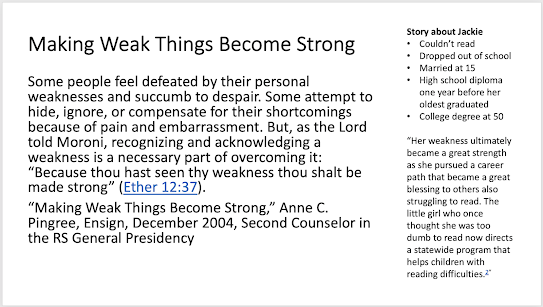I'm teaching on Sunday, the first Sunday School of the New Year!
Since I've prepared a lesson, I'm just sharing a number of the slides that I've prepared. These are most of the slides, not all of them, and just because I have them below doesn't mean I've actually use them in class. The slides are meant to drive discussion so I'll only add a few thoughts here and there related to what I was thinking about as a discussion point when I created the slide. As a reminder, you can click on the images below to view them full size.
The first few slides apply to starting the new year with a new scripture study area, but it also applies to the contents of Doctrine and Covenants 1, which is: How are you going to study your scriptures this year based on what you learned about yourself last year?
Referring to the known difficulties of 2020, President Nelson asked the below question. I think the way we studied our scriptures and listened to the Lord in prayer as we dealt with a difficult year will affect our answer to this question:
Image Source: Christ Walking on the Water, by Robert T. Barrett; GAK 243; Primary manual 7-17; Matthew 14:22–33; Mark 6:45-51
Sources:
Doctrinal Mastery Doctrine and Covenants and Church History Teacher Material,Lesson 17: Matthew 14,March 25–31: Matthew 14–15; Mark 6–7; John 5–6,Come, Follow Me—For Individuals and Families: New Testament 2019,Come, Follow Me—For Primary: New Testament 2019,New Testament Seminary Teacher Manual,Acquiring Spiritual Knowledge, Part 4,Matthew 14,Mark 6
More specifically, think about how you can improve this year based on what you did last year?
Image Source: Joseph Smith Seeks Wisdom in the Bible (Joseph Smith Seeks Wisdom from the Bible), by Dale Kilbourn; GAK 402; GAB 89; Primary manual 3-08; Primary manual 5-04; Joseph Smith—History 1:5–13
Sources:
02: Effective Study,Lesson 140: James 1,Teachings of Presidents of the Church: Brigham Young,Chapter 1: The First Vision: The Father and the Son Appear to Joseph Smith,Preach My Gospel,New Testament Seminary Teacher Manual,Chapter 43: Our Search for Truth and Personal Testimony,Teachings of Presidents of the Church: Joseph Smith,James 1,Joseph Smith—History 1
This text from the beginning of the Come Follow Me manual reminds us of WHY this is important:
Now, on to D&C 1! If you read the
Come Follow Me guide, you have already been reminded that Doctrine and Covenants is special because it's the only book that was given as latter-day revelation instead of a translation of earlier recorded works.
I'll try to let the class steer the conversation with the above questions but I also have my own answers of some of the themes I saw, and how that influenced how I will study Doctrine and Covenants this year. For instance, these scriptures stood out to me:
Some talks and quotes that came to my mind as I studied the above scriptures:
I also have a passage from a blog post that I wrote in
August 2020 about Alma 43-52, and how much it focused on Moroni and how he prepared his people.
I want to also make sure the class was aware that President Nelson talks about these things in this month's issue of the Liahona, which is linked right from the home page of
www.churchofjesuschrist.org
Here's another scripture and theme that really stood out for me:
Elder Nash, speaking to BYU-Idaho in 2019, helped the students there understand how Joseph Smith was an example of a weak thing made strong:
I had not read about how the preface to the Book of Mormon came about before, and was blown away. This was linked to from the Come Follow Me for Individuals and Families guide but
I'm linking to it here again because it's worth a read! It was so powerful for me to see how aware the council was of Joseph Smith's poor grammar and lack of education. I thought of so many examples of people being misjudged as weak. I have an example in here later of Tom Holdman and how the Lord made him strong in his weakness.
This is an incredible article that I have read many times. I highly recommend it. I planned to talk about this slide, but President Oaks (Elder Oaks at the time) gives a number of very specific examples of how strengths can become weaknesses, but how that doesn't mean we should hold back from using our strengths. It means we need to always have HUMILITY to make sure we are using our strengths in the right way, and not for personal glory and gain. He quotes the above Ether 12:27 to remind us the importance of humility:
We are reminded that we are not perfect, that we are here on earth to be tested and to try to be perfect like the Savior. To seek to become more like him, our loving Father in Heaven has given us modern-day revelation that we study, ponder, and prayer, and that we might make our weak things become strong.

The gospel of Jesus Christ is for everyone. The Lord says this several times throughout the scriptures, that he is "no respecter of persons." I'm grateful for a loving Heavenly Father that sent his beloved son, Jesus Christ, to earth to teach us how to live like him, and I'm grateful for modern revelation given to a young, imperfect prophet that was "made strong" by the Lord so that he could lead us in restoring the full gospel of Jesus Christ to the earth.






















No comments:
Post a Comment